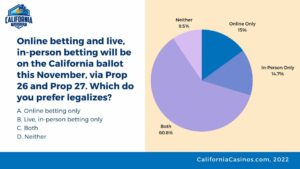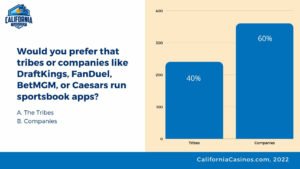In a recently commissioned California Casinos survey, 62% of respondents who identify as sports bettors or are interested in sports betting said they’re already placing sports wagers online.
Recognizing the clear current demand for unregulated sportsbooks is critical for California regulators to understand. Not only is unregulated sports betting driving Californians to offshore sportsbooks. The state is also missing out on millions of dollars in potential tax revenue from profits from California sports betting apps.
California Casinos commissioned a survey and conducted it through Pollfish. The survey polled 600 current and potential California sports bettors. Respondents who do not bet on sports and who are uninterested in betting on sports were disqualified from the survey. The survey’s margin of error was 4%.
Key findings from the survey include:
- 61% of survey respondents want both Prop 26 and Prop 27 to pass
- 60% of survey respondents prefer that private companies run California sportsbooks
- 57% of survey respondents find it very important to bet at a legal sportsbook
- 49% of survey respondents favor Prop 27’s plan for tax revenue
It’s telling that California already has a vibrant base of sports bettors. With sports betting successfully passing into mainstream sports awareness, that base of sports bettors will only grow in California.
“These survey results are pretty eye-opening,” Matthew Bain, news editor and content manager of California Casinos, said. “The fact that 61% of respondents want both Prop 26 and Prop 27 to pass suggests that would-be California sports bettors want as many options as possible. It also suggests both measures could very well pass in November, which would likely lead to a legal battle to determine which parts of each initiative will become law.”
READ MORE: CA Tribes Trying to Get Tribal-Led Online Sports Betting on 2024 Ballot. Is That Realistic?
Current California Online Sports Bettors
According to the survey results, 62% of potential legal California sports bettors already bet online. However, there’s some confusion among bettors about what constitutes sports betting. Some of these bettors are likely betting with online unregulated sportsbooks. Others may be playing using CA daily fantasy sports apps that offer sports betting in other states.
When asked which sportsbook apps they currently use, Californian bettors listed a mix of American and offshore brands. So, there may also be some misunderstanding about what counts as sports betting among some of the survey respondents.

However, that confusion is present among state legislators too. Debates about whether DFS games are games of skill or chance determine their legality in several states. Nevada requires gaming licenses for DFS operators. Idaho’s attorney general suggested that DFS was gambling under state law, leading DraftKings and FanDuel to leave Idaho in 2016.
So, the answers about which sports betting apps Californians use likely contain some statistical noise. It also suggests that the distinctions between similar types of gambling are less important to voters than it is to industry analysts, legislators, and Prop 26 and Prop 27 campaigners.
LOOKING AHEAD: JefeBet Wants to Be Top Sports Betting, Online Casino Site for California Latinos
Passing Both California Sports Betting Initiatives, Prop 26 and Prop 27
The California Casinos survey found that 61% of California sports bettors wanted both sports betting initiatives to pass. Only about 30% of bettors chose one initiative over the other. (Prop 26 and Prop 27 got about 15% each.)
There’s clearly a demand for both retail and online sports betting options together. California sports bettors seem to want the convenience of online sports betting paired with the communal area of a sportsbook lounge on a big game day.
While survey respondents would prefer both, online sports betting would be disproportionately profitable for California. In markets with both online and retail sports betting, online sports betting makes up about 90% of sportsbook handle. In some markets, that proportion is even higher. If profitability is the goal, online sports betting is the undisputed option.
But online sports betting comes with increased problem gambling rates, too. If California voters are going to choose the convenience of sports betting, then California regulators must plan to fund problem gambling programs.
PROP 26 vs. PROP 27: DraftKings Is ‘Cautiously Optimistic’ Prop 27 Will Pass in California
Importance of Legal California Sports Betting
With about 62% of would-be California sports bettors already betting online, some may wonder why sports betting needs to be legalized. However, current online sports bettors are either traveling to bet, betting offshore, or using VPNs to avoid geolocation restrictions.
There are a few issues with these approaches. Some offshore sportsbook brands are scams that steal bettors’ financial information. But other popular offshore brands operate with fair rules. So to sports betting customers, betting at illegal sites looks similar to betting at legal sites.
IF CA HAS SPORTS BETTING … Potential California Sportsbook Welcome Bonus Offers

However, offshore gambling companies don’t pay taxes to the states that bettors wager from. States lose millions of dollars each year in lost tax revenue to offshore sportsbooks. States without legal sportsbooks can also direct funds toward problem gambling from sportsbook tax payments. Finally, state regulators can monitor sportsbooks to prevent money laundering, which is a popular way to abuse sportsbooks in criminal markets.
California will reap the tax benefits of legalizing sports betting. But it may have to compete more heavily with offshore sportsbooks that have built more brand loyalty than California regulators may realize. According to the California Casinos survey, 57% of California sports bettors believe it’s very important to bet at legal online sites. But a 2020 AGA survey found that 55% of bettors who placed most of their wagers illegally believed they were betting legally.
This will be an ongoing challenge for California regulators.
STAYING NEUTRAL: Why Caesars Sportsbook Isn’t Picking Sides in Prop 26 vs. Prop 27 Battle
High Voter Enthusiasm for November Election
Californians are chomping at the bit for legal sportsbooks. They want retail and online sportsbooks, but some of them are betting already. However, it’s unclear how many of those bettors are placing sports wagers illegally and which ones are confusing DFS and sports betting.
Whatever the case, California will continue competing with offshore and illegal sportsbooks after it offers legal alternatives. Offering legal alternatives is a strong step. But once voters choose their sports betting proposals, California legislators must prepare to spend their new tax revenue on problem gambling programs and proper enforcement of the regulations California decides on.
TRUE OR FALSE: Fact-Checking Prop 26, Prop 27 Attack Ads in California Sports Betting Fight
California Casinos Survey Methodology
California Casinos collected survey responses from 600 California sports bettors in August 2022. Californians who indicated they did not currently place sports wagers and were not interested in sports betting were excluded from the survey.
Of those 600 respondents, 54% were male and 46% were female. The age demographics broke down as follows:
- 18-24 — 5% (The youngest respondent was 21.)
- 25-34 — 33%
- 35-44 — 32%
- 45-54 — 15%
- 55+ — 15%
For access to the full PDF of the California Casinos survey, contact Lindsay Goldner ([email protected]).